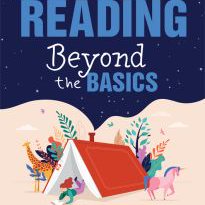
EvidentlyReading
@EvidentlyR
Followers
2K
Following
8K
Media
521
Statuses
6K
Intervention teacher for striving readers, literacy coach, author Cohort 2 Goyen Foundation Literacy Fellow. Bird nerd and word nerd.
Spokane, WA
Joined May 2019
@little__library @daisychristo So rather than thinking, 'How do we get kids interested in reading so they'll try harder in reading lessons?', schools instead should be asking themselves, 'Do our reading lessons get kids interested in reading?'
1
3
10
Want to learn more about the routine for decoding multisyllabic words that I discuss in the book? Register for the Close the Reading Gap summit! You'll get access to a truly great state of guests -- like @ReadingShanahan @TimRasinski1 and more! https://t.co/SBHpjR6Pyv
0
1
1
You can read a sample and purchase direct from the published here: https://t.co/vMFBoddF9e
solutiontree.com
Grounded in research-informed strategies, this book helps educators refine literacy instruction for grades 2–6. Explore lesson planning, text selection, and structured reading strategies across three...
1
0
0
Only 11 copies of Reading Beyond the Basics left on Amazon right now - more on the way! (Link below)
1
1
3
I'm hearing that people are receiving their copies of Reading Beyond the Basics! I'm so excited for you to read it and draw on the techniques to support your readers! If you find it helpful, reviews help others find it! (Link below) @SolutionTree
1
0
9
I really like the convo this thread opens up. What do we mean culturally by “love of reading,” why do we say it, who might that definition inadvertently disclude, and how might it muscle questionable pedagogy. In many ways, the project of the humanities depends on how we answer.
I've been thinking about what teachers mean when they say, "I want kids to love reading," or "I want kids to 'be readers.'" Because they mean a very specific, culturally-constructed type of love that looks a certain way. It looks like a mirror of these teachers. (1/9)
0
2
6
Typically excellent piece from @HKorbey but the elephant in the room is not @EdReports. Teachers are led to believe that *no* curriculum can suit the needs of individual students, to prioritize "student engagement," and waste effort on haphazard "differentiation." The norms and
I spoke with @HKorbey too, and I said what I said. This is the multi-million dollar elephant in the room. Link: https://t.co/XbtNSy8hHc
8
13
70
They might be sitting at a desk, not curled up on the floor, but they can still learn to love reading - if their teachers love the readers that they ARE, and not the readers that teachers see when they look in the mirror. (9/9)
4
2
29
I get why teachers like this paradigm. "Fostering a love of reading" feels more energizing than reaching kids TO read. They haven't experienced joyful reading that is also difficult. But let me tell you, kids can "be readers" when they read grade level text with support. (8/9)
1
3
27
...They get to read a "baby book" which they tell their teacher they like so they don't hurt her feelings. By defining "being a reader" narrowly, we let kids languish below grade level. (7/,9)
1
1
23
But the experience they provide isn't equitable because some children don't read grade level text. Some children don't happen to be placed in a book club where grade level conversation is happening. Some children need support to reach grade level, and instead of getting it (6/9)
1
0
16
That doesn't count to them because it's not "independent." They'd rather see a 4th graders curled up in a corner, reading a second grade book, than reading a 4th grade book with support. Let me say, these are not bad people, and the ones at my school are good teachers. (5/9)
2
1
23
They don't mean the reading that many of us do, reading research articles or tech manuals or emails at work. And they don't mean the way my intervention students read - working hard to learn decoding. Reading worthy novels together, with support. (4/9)
1
1
24
They don't mean the way my nephew reads when playing video games, fluently reading subtitles to catch the narrative in a game entirely in Japanese. They don't mean the way my BIL reads, searching best practices and new techniques to use on his farm. (3.5/9)
2
0
17
For them, "loving reading" means curling up around the room with a choice book or a book club book at a student's "level." It is based on the way teachers read at home for pleasure. (3/9)
1
0
22
This came up for me again because I had a hostile interaction with some teachers reacting out of fear as our school moves away from allowing teachers almost complete freedom to teach what they want. If we adopt a published curriculum, they say, kids won't "love reading." (2/9)
1
0
23






